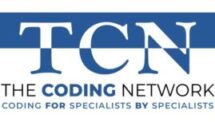The emergence of AI in medical coding is invariably impacting healthcare and traditional workflows and resource allocation. Yet, as AI platforms tout accuracy rates exceeding 90%, a critical question persists: Can autonomous coding stand alone? With payers tightening contract terms and regulators increasing scrutiny, human coders remain indispensable for ensuring compliance and accuracy.
In this post, we explore the regulatory landscape, payer expectations, and industry best practices to guide you through AI medical coding in 2025, including how The Coding Network’s AI Medical Coding Validation and AI Medical Coding Audit Services play a critical role in maintaining compliance, ensuring payer alignment, and future-proofing your coding operations.
What You’ll Learn:
- Why no U.S. federal regulation mandates universal human review of AI-coded claims, but payer contracts and compliance risks make it critical.
- How payer-specific policies, like those from Humana and Cigna, are driving the need for human coder attestation.
- The role of hybrid AI-human workflows in balancing efficiency with accuracy.
- Best practices, including TCN’s AI Medical Coding Validation and Auditing services, to align your processes with DOJ and OIG guidance.
- What to anticipate from upcoming CMS guidance and state-level AI transparency laws.
Is There a Federal Mandate for Human Review of AI-Coded Claims?
While some healthcare entities implement AI medical coding without any consideration to the veracity of their output, many organizations adopting AI medical coding wonder if federal regulations require human coders to review and sign off on every AI-generated code before submission to payers.
The U.S. Department of Health and Human Services Office of Inspector General (“OIG”) issued its General Compliance Program Guidance (“GCPG”) on November 6, 2023, as an authoritative yet voluntary, nonbinding resource summarizing federal laws like the False Claims Act (“FCA”), Anti-Kickback Statute, and HIPAA.
The GCPG emphasizes recommendations pertaining to oversight, quality controls, and internal auditing generally of AI-coded claims. Similarly, Centers for Medicare & Medicaid Services (CMS) guidelines prioritize coding accuracy and compliance, leaving implementation details—such as human review—to providers.
This regulatory flexibility underscores the importance of aligning with payer requirements and leveraging services like TCN’s AI Medical Coding Validation to ensure accuracy and compliance.
Why Are Payers Insisting on Human Medical Coding Oversight?
Payers, including Medicare Advantage (“MA”) plans like Humana and Cigna, are increasingly requiring providers to attest that AI-generated codes have been validated by credentialed coders. As of Q2 2025, these payer-specific policies reflect concerns about AI error rates and liability risks.
A May 2025 Oxford Global review found that large-language-model coding systems achieved less than 50% accuracy without human oversight, raising the risk of miscoding, such as up-coding, which could trigger FCA violations. The U.S. Department of Justice (“DOJ”) underscored this with a $23 million settlement in 2025 over an automated coding system that up-coded emergency department visits. These payer-driven requirements are contractual obligations, not federal mandates, but they highlight the need for robust oversight. Without validation of accuracy prior to submission of claims for reimbursement to these payors, the financial consequences remain dire.
TCN’s AI Medical Coding Audits and Compliance Reviews offer deep-dive evaluations to scrutinize AI-generated codes against provider documentation, ensuring compliance with payer policies and minimizing audit risks.
How Does the Hybrid AI-Human Medical Coding Workflow Work in Practice?
With the increased adoption of AI, the industry is embracing a hybrid approach where AI handles routine, high-confidence coding tasks, while complex or low-confidence cases are routed to human coders. An example is a platform like Aidéo’s Gemini™ which claims over 90% accuracy but incorporates a “Validation & QC” step where certified coders review every AI-suggested code.
Some revenue cycle management (“RCM”) vendors suggest that AI can reduce coder hours by 40-60% for routine charts, freeing resources for high-revenue encounters. AI-powered tools, such as Keragon’s self-audit dashboards (launched May 2025), assist human auditors by flagging anomalies, while final decisions remain with credentialed professionals. TCN’s AI Medical Coding Validation Services enhance this hybrid model by leveraging certified specialty focused experts to validate AI outputs against ICD-10-CM, CPT, and PCS standards, ensuring accuracy and optimizing reimbursement.
This approach balances efficiency with compliance, reducing claim denials and supporting revenue cycle stability.
What Are the Best Practices for AI Medical Coding Compliance in 2025?
To navigate AI medical coding effectively, healthcare organizations should adopt industry best practices aligned with DOJ and OIG guidance:
- Implement a Dual-Pass Workflow: AI assigns provisional codes, followed by a certified coder’s review and electronic sign-off before claim submission.
- Use Explainability Logging: Capture the AI system’s rationale (e.g., key terms, guideline references) for transparency with auditors and payers.
- Conduct Monthly Model Audits: Compare AI and human coder outcomes across specialties, recalibrating models if variance exceeds 3%. TCN’s AI Medical Coding Audits provide actionable insights to optimize AI systems and enhance coding operations.
- Maintain Continuous Coder Training: Route complex cases to experienced, specialty-specific coders to preserve expertise, with AI handling high-volume tasks.
- Align with Compliance Guidance: Map AI workflows to OIG and DOJ recommendations, documenting human review as “reasonable and necessary” to mitigate FCA risks.
These practices, supported by TCN’s specialized auditing and validation services, help meet payer expectations and safeguard against penalties while maximizing efficiency.
What’s on the Horizon for AI Coding Regulations?
The regulatory landscape for AI medical coding is evolving. CMS is expected to release additional draft guidance on autonomous coding systems in the FY 2026 Inpatient Prospective Payment System (IPPS) proposed rule in June 2025, potentially clarifying human oversight expectations.
State legislatures in California and Texas are considering bills (e.g., California’s AB 3030, Texas’s H 4635) requiring disclosure of AI participation in code selection, which could influence compliance requirements. Commercial insurers are piloting AI-to-AI handshake protocols that may reject unaudited AI claims in real time, signaling stricter payer policies. Healthcare organizations should monitor these developments and partner with experts like TCN, whose AI Medical Coding Validation and Audits ensure readiness for emerging regulations by delivering compliance-focused, specialty-specific reviews.
Staying proactive will position providers to adapt seamlessly to new requirements.
FAQ Section
Does federal guidance suggest that human coders to review AI-coded medical claims?
Yes, authoritative bodies such as HHS’s OIG recommend auditing of claims submitted for reimbursement to Medicare and Medicaid to ensure that the AI performs in the manner that companies purport they do. Moreover, payer contracts and compliance best practices often necessitate human oversight to ensure accuracy and mitigate risks. While there are no current regulations mandating universal human review of AI-autonomously coded claims as of June 2025, the agencies tasked with oversight have already signaled that due diligence should be conducted on AI coded claims.
Why are payers like Humana and Cigna requiring human coder attestation?
Payers are updating contracts to require human validation of AI-generated codes to reduce errors, prevent fraud (e.g., up-coding), and align with CMS guidelines. These are contractual requirements to minimize claim denials and audits.
What is the hybrid AI-human coding approach?
This approach uses AI for routine, high-confidence coding, while complex or low-confidence cases are reviewed by credentialed coders. Services like TCN’s AI Medical Coding Validation enhance accuracy and compliance in this model.
How can we protect against False Claims Act (FCA) violations when using AI coding?
Adopt a dual-pass workflow, maintain explainability logs, conduct regular audits with tools like TCN’s AI Medical Coding Audits, and align with OIG/DOJ guidance. Documenting human review helps mitigate FCA risks.
What should we expect from CMS’s upcoming guidance on AI coding?
CMS’s draft guidance, expected in the summer of 2025, may address autonomous coding systems. While details are pending, it could emphasize human oversight and quality controls, so providers should prepare with robust validation processes.
Getting Started in Three Steps
-
Book a 15‑Minute Compliance Call
Map your workflow and preload coder profiles (no cost, no obligation). -
Choose Your Coverage Model
Real‑time validation on every chart, a targeted sample, or quarterly audits—any specialty, any volume. -
Send the “GO” Signal
Email “GO”; TCN validates or audits within 48 hours.
Reserve My 15‑Minute Call »
AI will keep rewriting the speed limits of medical coding. With TCN’s human‑in‑the‑loop validation and audit services, you can accelerate confidently—no matter how strict the compliance terrain becomes.
Conclusion
AI is reshaping medical coding, offering unparalleled efficiency and the potential to streamline revenue cycles. Yet, as of June 2025, no U.S. federal regulation mandates universal human coder review for AI-generated codes, oversight agencies have already indicated that best practices should be implemented which validate that the AI coded submissions be validated. Payer policies, such as those from Humana and Cigna, and DOJ’s focus on FCA enforcement highlight the critical role of human oversight in ensuring compliance and accuracy. By embracing a hybrid AI-human workflow, adopting best practices like dual-pass reviews and quarterly audits, and leveraging TCN’s AI Medical Coding Validation and Audits and Compliance Reviews, healthcare organizations can harness AI’s benefits while safeguarding their financial and regulatory standing. For CodingNetwork.com clients and prospects, partnering with TCN’s certified experts ensures your coding processes are both innovative and compliant, ready for the evolving healthcare landscape.





